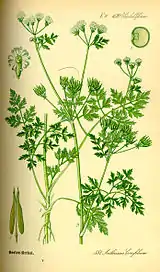chervil
English

chervil Anthriscus cerefolium
Etymology
From Middle English chervell, from Old English cerfelle, from Anglo-Norman chervele (compare Jèrriais chèrfi), from Latin chaerephylla, plural of chaerephyllum, from Ancient Greek χαιρέφυλλον (khairéphullon).
Pronunciation
- (US) IPA(key): /ˈt͡ʃɜː(ɹ)vɪl/
- Rhymes: -ɜː(ɹ)vɪl
Audio (Southern England) (file)
Noun
chervil (countable and uncountable, plural chervils)
- (countable) A leafy herb, Anthriscus cerefolium, resembling parsley.
- 1940, Rosetta E. Clarkson, Green Enchantments: The Magic Spell of Gardens, The Macmillan Company, page 253:
- The life of one plant would be affected by another. Rue was definitely hostile to basil, rosemary to hyssop, but coriander, dill and chervil lived on the friendliest of terms[.]
- (uncountable) Leaves from the plant, used as an herb in cooking, which have a mild flavor of anise.
- 2016, Susan Belsinger, Arthur O. Tucker, The Culinary Herbal, Timber Press, →ISBN, page 57:
- No herb, except perhaps tarragon, is quite so French as chervil, an association that is not surprising for a nation known for its celebration of fine food and the subtle use of herbs.
Synonyms
- (plant): garden chervil, French parsley
- (leaves of herb): gourmet's parsley
Derived terms
Translations
plant
spice
|
References
 chervil on Wikipedia.Wikipedia
chervil on Wikipedia.Wikipedia  Anthriscus cerefolium on Wikipedia.Wikipedia
Anthriscus cerefolium on Wikipedia.Wikipedia  Anthriscus cerefolium on Wikispecies.Wikispecies
Anthriscus cerefolium on Wikispecies.Wikispecies  Anthriscus cerefolium on Wikimedia Commons.Wikimedia Commons
Anthriscus cerefolium on Wikimedia Commons.Wikimedia Commons
Anagrams
This article is issued from Wiktionary. The text is licensed under Creative Commons - Attribution - Sharealike. Additional terms may apply for the media files.